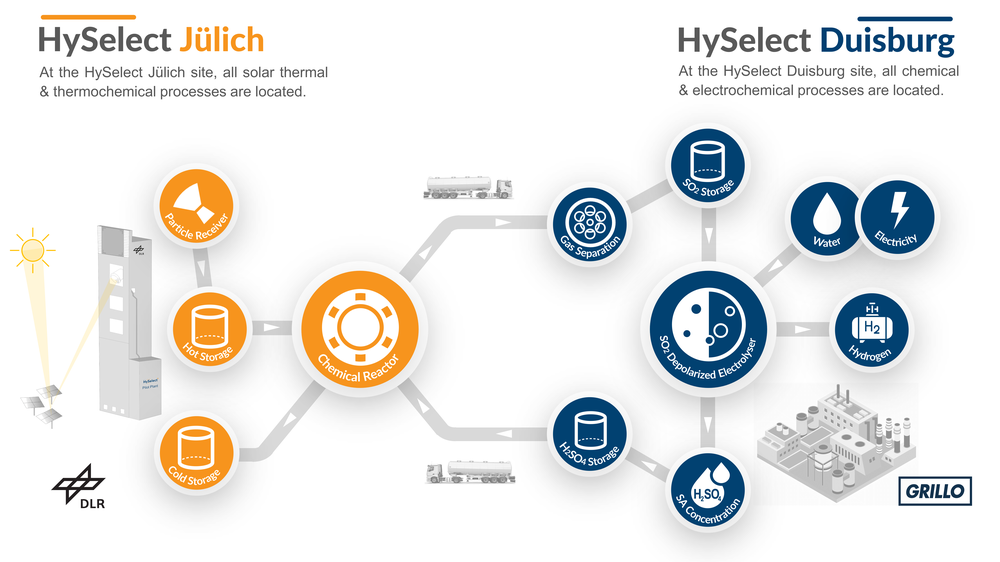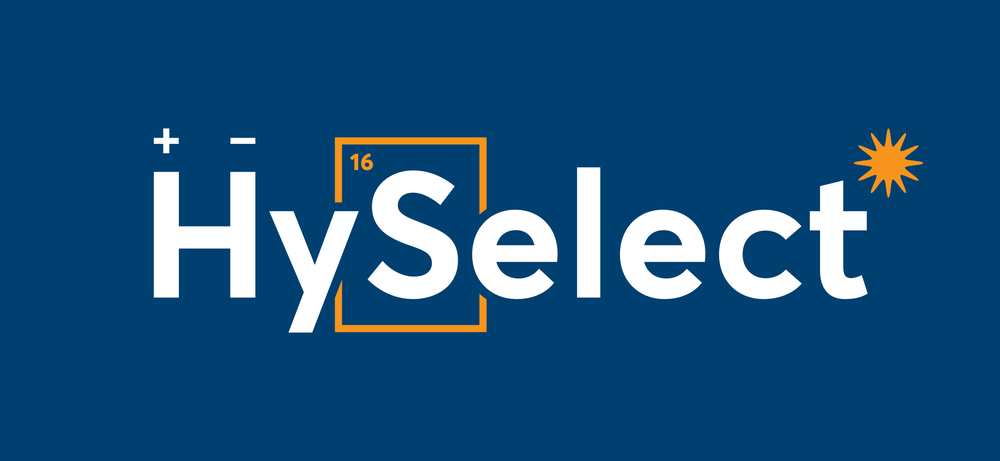HySelect

Round-the-clock, high-efficiency renewable hydrogen production through a thermochemical cycle based on Sulphuric acid
Duration: 1.1.2023 - 31.12.2026
HySelect, an EU project funded by the Clean Hydrogen Partnership aims to demonstrate the production of renewable hydrogen (H2) by splitting water via concentrating solar thermal (CST) with an attractive efficiency and cost, through the Hybrid Sulphur cycle (HyS). The project will introduce, develop and operate under real conditions a complete H2 production chain.
The focus lies on two innovative, full scale plant prototype core devices for both steps of the HyS cycle: a sulphuric acid decomposition-sulphur trioxide splitting reactor (SAD-STS) and a sulphur dioxide depolarized electrolyser (SDE).
Solar hydrogen production
Recent developments and innovations will be implemented to achieve a highly efficient, long-term and cost-competitive concentrated solar energy driven thermochemical hydrogen production. Renewable hydrogen can help energy-intensive sectors such as the steel and chemical industries to achieve climate neutrality. However, high volumes are required for this.
Hydrogen production through thermochemical cycles (in particular the Hybrid Sulphur Cycle) is a promising pathway that uses high-temperature heat from concentrating solar thermal systems to drive the endothermic reactions. The advantage of the Hybrid Sulphur cycle is that it consists of only two steps: the thermal decomposition of sulphuric acid at a high temperature (yet under 900 degree Celsius) and the subsequent sulphur dioxide depolarized electrolyis at a lower temperature (50-80 degree Celsius) to produce renewable Hydrogen.
The testing facility
The project will use concentrated solar radiation as a heat source in particular through the innovative centrifugal receiver CentRec® developed and patented by DLR.
The HySelect technology will be implemented at two sites. At the Jülich heliostat field, next to the large-scale solar tower of DLR, the receiver will be tested in the Multifocus tower. An on-site test plant is being expanded to include equipment for the thermochemical process. The HySelect chemical plant as well as the innovative HySelect electrolyser will be implemented at the Grillo plant in Duisburg.
Hybrid Sulphur cycle
The HySelect project foresees to cover the entire materials and process value chains of both concentrated solar energy-driven SO3 splitting and SO2 depolarized electrolysis. The ambition is to close the technical gaps and provide the missing links in the overall, complete HyS cycle technology concept, for a realistic overall evaluation of the technology and its scaleup.

Furthermore, a heat recovery system will be integrated to exploit the temperature difference within the cycle and boost the overall process efficiency. In the course of the work, non-critical materials and catalysts will be developed, qualified and integrated into the plant scale prototype units for both the acid splitting reactor and the SDE unit.
Experimental work will be accompanied by component modelling and overall process simulation and culminate with a demonstration of the complete process integrating its key units of a centrifugal particle receiver, a hot particles storage system, a sulphuric acid splitting reactor and a sulphur dioxide Depolarized Electrol into a pilot plant. Testing for a period of at least six months in the large-scale Multifocus tower, driven with smart operation and control strategies, will establish the HySelect targeted efficiency and costs.
Finally, an overall process evaluation will be carried out in order to assess the technical and economic prospects of the HySelect technology, directly linked to the know-how and developments of the sulphuric acid and water electrolysers industries. Thus, the real practical needs of Europe’s hydrogen-related industry will be addressed by implementing innovative ideas and solutions. At the same time, their benefits will be validated through their extended proof-of-concept scale operation on-site and further developed through rapid scaling and commercialisation.
Further information is available on the project website:
Project | HySelect |
|---|---|
Duration | 1.1.2023 - 31.12.2026 |
Project participants | |
Funding | Funded by the European Commission through the Clean Hydrogen Partnership HORIZON JU Research and Innovation Actions HORIZON-JTI-CLEANH2-2022-01-06 programme, under grant agreement No 101101498. |

